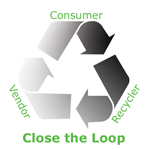 Take a hypothetical investment in your home of $1,000 for a new hot heater that will save $100 a year. Most people will “do the math” and determine that the heater will pay for itself in ten years, then decide that this is too long and put the money into something else e.g; a vacation or stashing it in savings. Unfortunately this usually isn’t the efficient or “correct” or choice though, and it has been influenced by the use of a distorting metric. An alternative metric which is just as simple to calculate is the simple return on investment or ROI. Rather than divide the savings into the cost, do the reverse and you get the effective “interest rate” of your investment a rather favorable return of 10%1
Take a hypothetical investment in your home of $1,000 for a new hot heater that will save $100 a year. Most people will “do the math” and determine that the heater will pay for itself in ten years, then decide that this is too long and put the money into something else e.g; a vacation or stashing it in savings. Unfortunately this usually isn’t the efficient or “correct” or choice though, and it has been influenced by the use of a distorting metric. An alternative metric which is just as simple to calculate is the simple return on investment or ROI. Rather than divide the savings into the cost, do the reverse and you get the effective “interest rate” of your investment a rather favorable return of 10%1
Some are arguing that in addition to the analogous EROI, we need to develop supplementary metrics to insure wise policies. The hope being that by crunching the numbers first we might—for instance—avoid tainting the public’s perceptions of all biofuels through bullish support of the inefficient conversion of some food crops to liquid fuel.
And what do we call the energy savings resulting from sound policy choices? One term that’s been used is the negawatt, but there is a proposal for a new unit: the Rosenfeld.
1. Compare 1–2% for a savings account or certificate of deposit, and a negative rate (depreciation) for common purchases such as automobiles or consumer electronics.
 Not “reading, writing and ‘rithmetic” but reduce, reuse and—most notably—recycling. The Boston Globe has an article reporting that Massachusetts recycling rates are stagnant, and relatively low. A rather timely report given the effort by numerous organizations to get Beacon Hill to update the bottle bill.
Not “reading, writing and ‘rithmetic” but reduce, reuse and—most notably—recycling. The Boston Globe has an article reporting that Massachusetts recycling rates are stagnant, and relatively low. A rather timely report given the effort by numerous organizations to get Beacon Hill to update the bottle bill.






